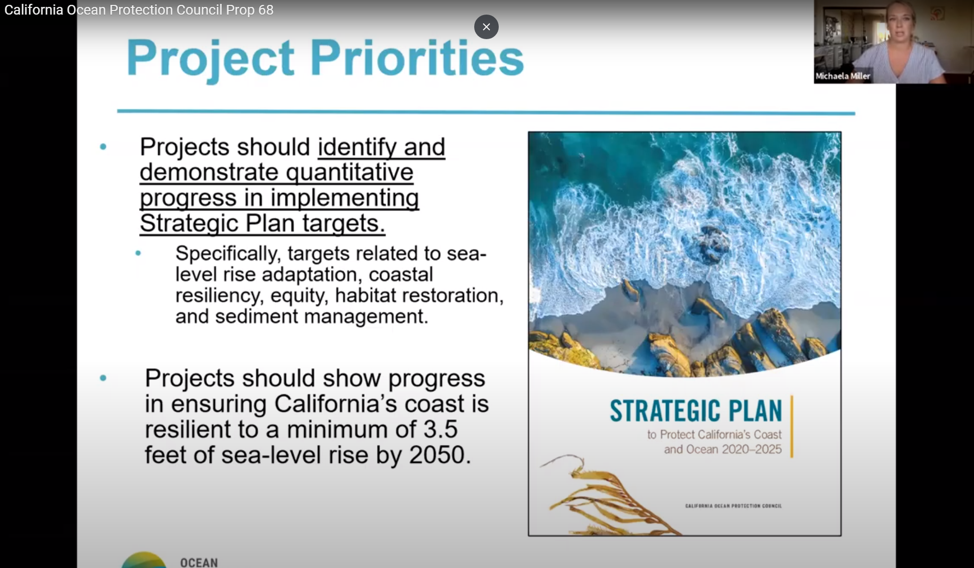About a year ago, I accepted a fellowship with the Ocean Protection Council’s (OPC) Climate Change program and I was ecstatic. Although I was nervous to move to Sacramento, I was excited to channel my inner Leslie Knope for a year and experience everything our state’s capitol has to offer. This is where decisions about managing our state’s coasts and oceans are made, and I was ready to dive in to the world of science, policy, and management at OPC—a small but mighty cabinet-level agency that serves as the governor’s advisor of ocean and coastal policy.
OPC has a unique role in state government. The primary goal of OPC is to provide a unified vision for managing California’s coasts and oceans. This is done by providing policy recommendations based on the best available science, convening coordination between other public agencies, tribal governments, non-profits, academia, and the public, and through funding high priority projects that advance the goals outlined in the Strategic Plan.
 Despite only physically being in Sacramento for less than a month before the stay-at-home order went into effect, I still hit the ground running as soon as my fellowship began in February. In my first week at OPC, the strategic plan for the next 5 years had just been approved. I was immediately given grants to manage and was eager to see what I could contribute to advancing the strategic plan goals in my year at OPC. But how do you even make a dent in such a bold strategic plan? How do you fund projects that advance these goals? I started to understand this process, and exactly how OPC works, through my involvement with Proposition 68 (Prop 68).
Despite only physically being in Sacramento for less than a month before the stay-at-home order went into effect, I still hit the ground running as soon as my fellowship began in February. In my first week at OPC, the strategic plan for the next 5 years had just been approved. I was immediately given grants to manage and was eager to see what I could contribute to advancing the strategic plan goals in my year at OPC. But how do you even make a dent in such a bold strategic plan? How do you fund projects that advance these goals? I started to understand this process, and exactly how OPC works, through my involvement with Proposition 68 (Prop 68).
Prop 68, more formally known as the “California Drought, Water, Parks, Climate, Coastal Protection, and Outdoor Access For All Act of 2018” was a voter-approved bond measure passed in the June 2018 election. Prop 68 was the first opportunity on the ballot in 12 years for voters to put significant funding—$4.1 billion to be exact—towards parks, water projects, and climate adaptation efforts throughout the state. Prop 68 is the largest single conservation bond in California history.
OPC was appropriated $21.2 million of Prop 68 funds to advance climate change priorities, and $10 million of those funds were set aside to advance coastal resiliency. My first major task as a fellow within the climate change program was to take a stab at drafting a request for proposals for projects or research that will address, create, or implement nature-based solutions to sea-level rise.
Through multiple discussions, drafts, and climate team meetings, I learned just how challenging it is to address both the priorities of a statewide bond measure as well as OPC’s coastal resilience priorities. Nevertheless, the first request for proposals for Prop 68 was released in August, and the response was overwhelming. We received close to 100 letters of intent, showing that there is a critical need to build coastal resiliency. Throughout this whole process, I have gained valuable insight on how to advance strategic plan goals. I’ve also realized what propositions can do and just how important it is to vote on the issues and people that determine how our tax dollars are spent. When I voted yes on Prop 68 in 2018, I had no idea that a little over two years later I would become intimately familiar with this voter-approved bond or just how timely and essential Prop 68 funds would be for California. We are currently in the review process for Prop 68, but keep an eye out for these projects in early 2021!





